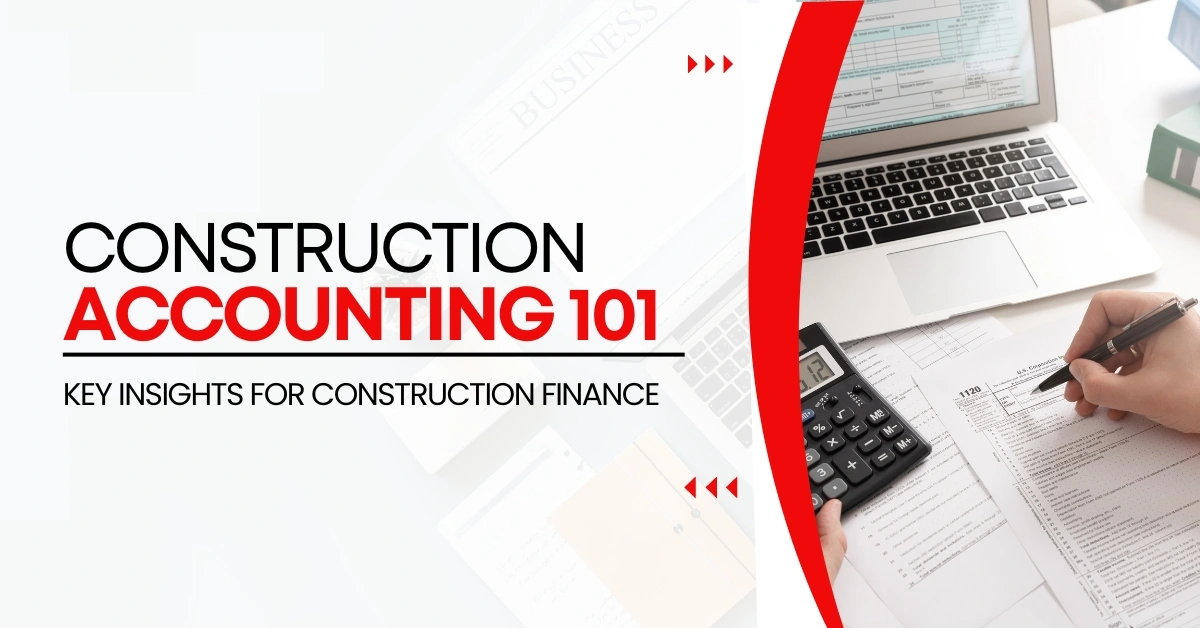Why Construction Accounting is Crucial for Long-Term Business Growth
Recognizing the Significance of Construction Accounting for Effective Task Monitoring

Role of Building Audit
Building accounting offers as the foundation of monetary administration in the building sector, guaranteeing that projects are finished within budget plan and monetary objectives are met. construction accounting. This specific accountancy method addresses the distinct difficulties dealt with in building projects, consisting of differing project durations, fluctuating prices, and multiple stakeholders
Among the primary roles of construction audit is to offer accurate price estimate and tracking throughout the project lifecycle. This assists in educated decision-making, making it possible for project managers to readjust resources and timelines properly. Additionally, building bookkeeping enhances cash money flow management by monitoring accounts payable and receivable, hence guaranteeing that funds are offered for prompt settlements to providers and subcontractors.
It equips job managers with the essential financial information to prepare in-depth financial declarations, which are essential for audits and economic testimonials. Eventually, the function of building accountancy extends beyond simple economic tracking; it is important to strategic preparation and operational performance, driving the success of construction jobs in an affordable landscape.
Trick Parts of Building Accountancy

Budgeting establishes an economic framework that overviews project execution, enabling managers to designate sources successfully and anticipate possible financial obstacles. Exact expense monitoring is crucial for tracking expenditures in real-time, helping to identify variations between predicted and real expenses. This enables timely adjustments to keep the job on budget plan.
In addition, financial reporting offers stakeholders with a clear picture of the project's financial health and wellness. Normal reports, such as earnings and loss statements and cash money circulation analyses, assist in notified decision-making and boost transparency among all parties involved.
Additionally, compliance with industry regulations and bookkeeping standards is essential. This guarantees that financial methods are not just effective yet additionally lawful, safeguarding the organization versus legal consequences. By integrating these key parts, building and construction bookkeeping promotes a structured strategy to taking care of monetary sources, inevitably adding to the successful conclusion of construction projects.
Benefits for Project Managers
Leveraging effective building and construction audit methods provides project supervisors with a multitude of benefits that boost both operational efficiency and monetary oversight. One considerable benefit is improved budget plan management. Accurate tracking of incomes and expenses enables job managers to check monetary efficiency in genuine time, making certain jobs continue to be within spending plan and helping with timely modifications when needed.
Moreover, building accountancy simplifies cash flow administration, allowing task supervisors to anticipate financial needs and maximize source allotment. By recognizing cash money inflows and outflows, they can better handle repayments to subcontractors, staff members, and vendors, thereby avoiding costly delays.
Furthermore, robust bookkeeping systems provide comprehensive reporting capabilities. Task supervisors can generate reports that supply understandings right into task profitability, cost differences, and source usage. This data-driven technique promotes notified decision-making, permitting supervisors to recognize possible problems proactively and execute rehabilitative measures.
Finally, adherence to building accounting standards makes sure conformity with legal and regulatory demands, reducing the risk of disputes or fines. Overall, efficient construction accounting furnishes project supervisors with the devices required to drive project success, enhance stakeholder self-confidence, and advertise lasting organizational growth.
Typical Challenges in Building And Construction Accountancy
Lots of job supervisors encounter substantial challenges in construction audit that can prevent project success. Among the key obstacles is the complexity of tracking multiple work sites, each with distinct budget plans, timelines, and resource appropriations. This requires thorough interest to information, which can be overwhelming without a durable bookkeeping system in position.
In addition, varying material costs and labor prices can make complex spending plan monitoring, making precise projecting challenging. Job supervisors usually battle to reconcile these prices with real expenses, bring about possible financial disparities.
Additionally, building and construction accounting involves conformity with numerous laws, consisting of tax commitments and labor regulations. Browsing my site these rules can be challenging, especially for supervisors that might not have a solid bookkeeping background.
An additional significant obstacle is handling cash flow, which is critical in the construction sector. Hold-ups in invoicing, payments from clients, or unforeseen job adjustments can create capital lacks, jeopardizing the project's progress.
Finally, reliable communication in between task managers, accounting professionals, and area teams is essential. Misconceptions can lead to unreliable monetary reporting, further making complex task monitoring efforts. Resolving these obstacles proactively is vital for effective construction audit.

Finest Practices for Effective Accountancy
While browsing the intricacies of construction audit can be difficult, embracing ideal techniques can substantially improve economic monitoring and project success. One essential technique is preserving prompt and precise documents. Applying durable accountancy software tailored to building tasks can improve data entrance, invoicing, and reporting, decreasing mistakes and saving time.
Furthermore, developing a clear budget and normal monitoring versus this spending plan are important. Using a system of regular financial reviews permits project managers to determine variances early, helping with timely decision-making. It is also necessary to separate project prices right into direct and indirect classifications, enabling more clear understandings right into success.
An additional best method involves fostering open communication amongst all stakeholders. Normal updates and joint conversations concerning monetary standing can guarantee everybody is lined up and notified. Training team in construction-specific accounting principles additionally boosts competency and precision.
Last but not least, guaranteeing compliance with appropriate accountancy standards and laws is non-negotiable. Regular audits and interior reviews add to openness and responsibility, building trust fund with clients and stakeholders. By focusing on these best practices, construction companies can enhance their accounting procedures, eventually driving task success and economic stability.
Verdict
In conclusion, building accounting Learn More Here plays an essential role in making sure successful project monitoring by assisting in precise economic oversight and improving decision-making. By integrating key components such as price estimate, cash flow monitoring, and conformity, task managers can navigate usual difficulties and take advantage of finest practices for efficient audit. Inevitably, a durable construction accountancy framework not only safeguards spending plan integrity but likewise adds to the overall monetary health of building and construction jobs, cultivating sustainable success within the sector.
By incorporating these vital parts, building and construction audit cultivates an organized try here approach to handling economic resources, ultimately contributing to the effective conclusion of building and construction projects.
Precise tracking of incomes and expenses permits project supervisors to keep an eye on financial efficiency in genuine time, guaranteeing tasks remain within spending plan and helping with timely adjustments when needed.
Job managers can produce records that offer understandings right into task profitability, price variations, and resource use.Many job managers experience considerable challenges in building accounting that can prevent task success. construction accounting. Ultimately, a durable building bookkeeping framework not just safeguards budget stability yet additionally contributes to the general economic health of building jobs, cultivating sustainable success within the market